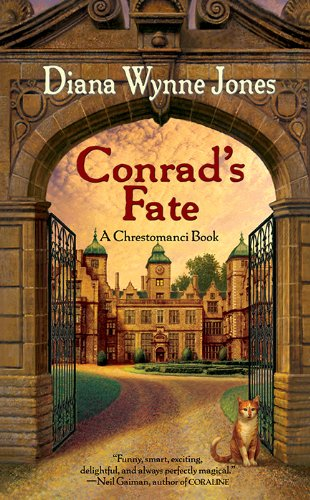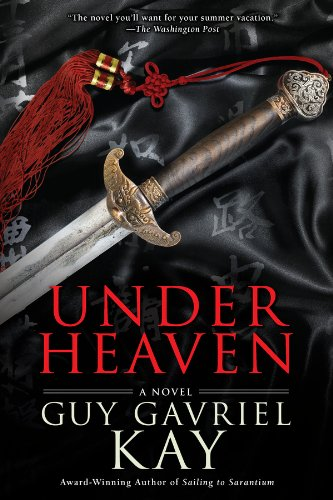Recent Reading: Conrad’s Fate by DWJ
I’ve had Conrad’s Fate sitting on my coffee table for literally years, possibly since I first thought, hey, you know what, I should reread some of the DWJ novels I’ve only read once and don’t remember well. This is one of those. I do think of the Chrestomanci books as the most classic DWJ books, but I kind of mean the original ones. On the other hand, always happy to see Chrestomanci, so sure, onward.

In Conrad’s Fate, Conrad is the protagonist and he’s kind of annoying to read about for a while, which is one reason why I didn’t reread this one earlier. Also, I got distracted by my own writing and quit reading anything, basically, but still, Diana Wynne Jones, hard to go that wrong. So when the power was off and this book was still sitting on my coffee table, I finally picked it up and read it. Not for the first time, but it might as well have been, because I didn’t remember anything about it.
So, wow, you know, if you think about it, there sure are a lot of horrible families in DWJ’s novels, aren’t there? Truly horrible. Conrad’s family, when the book opens, consists of a mother who is so neglectful she might as well be a faded ghost, an uncle who is deceitful, manipulative, and frankly evil in the worst kind of petty, selfish, stupid way, and an older sister who escaped this home and left Conrad behind. Which is not entirely her fault, but kind of? I mean, she is a young adult, not a kid. Granted, she probably didn’t know quite how much trouble Uncle Alfred would set Conrad up for. Which is a lot. Because —
All right, hang on. So, there’s this mansion where this very rich aristocratic family lives, and for various reasons Uncle Alfred wants someone there killed, so he sets Conrad up to murder this person by telling Conrad he is under a curse, basically, and has to kill this person or he, Conrad, will die. And Conrad, who is an idiot — okay, fine, he’s young, and this guy is his uncle, after all — anyway, Conrad believes this and takes a job as a sort of apprentice footman in order to kill this person. Except on the way to apply for job, he meets Christopher Chant, who is about the same age, but far, far more experienced and knowledgeable, of course, and there for reasons of his own. And thus, the story.
Which is a lot of fun, with tons of details about service in giant mansions. The story gets layered with all sorts of ridiculous plot twists, almost all of which work, and this amazingly cool ruined mansion that appears in dozens of different iterations. If you’re not keen on heights, the description of climbing down from the top of the rickety wooden tower will chill your blood. I like heights, but I wouldn’t have wanted to try that. Conrad gets distracted from the curse (which doesn’t exist, remember) by being just run off his feet plus embroiled in Christopher’s adventures, and then Millie turns up, and eventually he accepts that he isn’t under a curse and Uncle Alfred was lying about everything, and a lot of actors are hired to pretend to be in service, and it’s all quite a romp.
I liked this story a lot. Mostly. But it’s not an altogether successful novel, imo, because I don’t think the ending works. This is a structural problem. We have a leisurely set-up, where the reader is thinking, For God’s sake, Con, Uncle Alfred is lying to you about everything! This is fine, though somewhat painful because you’d sure like Conrad to figure out that his uncle is lying to him earlier. DWJ did this in a different book, too. Let me see, which one am I thinking of? Oh, it’s Drowned Ammet, where Mitt’s mother lies to him about everything and tries to get Mitt to do awful things and it takes practically forever for Mitt to realize this. Again with the horrible family, and horrible in this specific way, deceitful and manipulative and willing to throw the children into terrible danger because they just don’t care a whit about the kids. I only ever read that one once too, and this is why.
However, that’s not what I mean by a structural problem. “Horrible deceitful manipulative family” is a trope, not an element of structure. I hate that trope, but it is of course satisfying to see the kid break away from the lies and manipulation, so that’s something I think you can count on with DWJ. But, Conrad’s Fate has a fairly leisurely set-up and then a madcap romp and then Gabriel de Witt appears as the current Chrestomanci, with a lot of authorities from Conrad’s world, and puts everything right very briskly. After which there is a short, like two-page, epilogue in which the reader is told that everybody lives happily ever after, but NONE of the falling action scenes are shown. And I hate that. I really hate it!
True, I like falling action. (A lot, apparently, since I keep writing such extended falling action myself). But I do really detest having the author point and say, “Look over there! Hey presto! Now you can look back at the main story and behold! Everything has been solved while you glanced away. Now, six years later, everybody is doing great.” This is almost exactly what happens here. I’m barely exaggerating.
So, for me, this element really drops a story way down. I just detest this kind of ending. Non-ending.
And you know who else did this and I didn’t like it then either? GGK in Under Heaven, which is otherwise a spectacularly beautiful novel.

I absolutely love this novel. Truly. But the ending made me ask, “But how about writing the actual ending? What happened? Did the deadline rear up ahead of you and you just had to stop?” Another fifty to hundred pages would have been about right.
I can’t think of many other traditionally published titles where the author stops short of the ending and then winds up the story with a brisk explanation of where everyone winds up, without showing any of them getting there. This is something I’ve seen a couple times in self-published novels. Where, by the way, deadlines aren’t a thing, generally, so I guess the author just got bored? I honestly don’t understand this.
Traditional or self-published, my personal advice is, write the ending, the whole ending, and don’t stop until you’ve gotten to the end. I love epilogues, but they should not be a substitute for the ending and they should not just say, “Six years later, everyone was much happier.”
SO! Final comment: perfectly fine for a DWJ completist, lots to enjoy here, but Conrad’s Fate is not one of her best.
What is her best? Well, it’s hard to beat Dogsbody.
Here are the ten DWJ stories I personally like best.
Please Feel Free to Share:






The post Recent Reading: Conrad’s Fate by DWJ appeared first on Rachel Neumeier.



